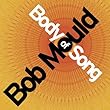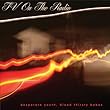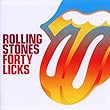The song that follows, co-written by K.D. Lang with David Piltch, is a ballad affirming the simplicity of love, and what it is like to hold it. Most of the songs on Hymns of the 49th Parallel are about nature and love,…
Tag: music
Respecting & Adding to Tradition: the San Francisco Jazz Collective
Who can bring together the fragments of our perceptions—and of our experiences—but an artist? And to do it without words, but in a language of sound, is difficult. By Daniel Garrett SF Jazz Collective (self titled recording) Producer: Jeff Cressman…
A review of Cassandra Wilson’s Thunderbird
Despite Wilson’s singing, which is always expressive, never bland, I thought there was something calculated and unyielding, something inexpressive, about the music. The more I listen to the music, the better I can hear it—but I think there is often…
Respectable Disappointment: Bob Mould’s Body of Song
 Rock music is associated with cool temperaments and hot passions, with firm masculinity and anti-establishment ambivalence, with noise and with peace—with so many contradictory attitudes and states that it is no wonder musicians feel the need to pose before playing. That is not healthy.
Rock music is associated with cool temperaments and hot passions, with firm masculinity and anti-establishment ambivalence, with noise and with peace—with so many contradictory attitudes and states that it is no wonder musicians feel the need to pose before playing. That is not healthy.
Mixed Musical Methods: TV on the Radio
 There are discrete elements of folk, rock, and subtle dance music, and even world music, in the work of TV on the Radio. (I think also of Bobby McFerrin and Nona Hendryx.) It is fascinating that the band has been acclaimed for producing rock music (I sometimes think that whatever certain critics like they call rock music—until they stop liking it).
There are discrete elements of folk, rock, and subtle dance music, and even world music, in the work of TV on the Radio. (I think also of Bobby McFerrin and Nona Hendryx.) It is fascinating that the band has been acclaimed for producing rock music (I sometimes think that whatever certain critics like they call rock music—until they stop liking it).
Disillusionment and Extreme Pleasures: the Rolling Stones’ Forty Licks
 There is something still wonderful about Jagger being so compelling a figure—desired, envied, respected—without being likable. Mick Jagger’s sensuality has no savoring softness and his sorrow has no sensitivity—his is a very modern temperament. (It is possible he synthesized the eloquence of British literary tradition with the hedonistic license of the blues and the experimental openness of modern art.)
There is something still wonderful about Jagger being so compelling a figure—desired, envied, respected—without being likable. Mick Jagger’s sensuality has no savoring softness and his sorrow has no sensitivity—his is a very modern temperament. (It is possible he synthesized the eloquence of British literary tradition with the hedonistic license of the blues and the experimental openness of modern art.)
The Lasting Icon: Elvis Presley and his 30 #1 Hits
< Hearing Elvis Presley’s songs again, I become aware that a song can break your heart—and it’s not always the song you think it is going to be or for the reason you expect. A song can remind you, as it has me, of a time when you were younger, when you took much for granted, and you can weep at that kind of innocence, even though innocence—or ignorance—came to cause you so much pain.
Hearing Elvis Presley’s songs again, I become aware that a song can break your heart—and it’s not always the song you think it is going to be or for the reason you expect. A song can remind you, as it has me, of a time when you were younger, when you took much for granted, and you can weep at that kind of innocence, even though innocence—or ignorance—came to cause you so much pain.
Howlin’ Wolf and the Blues, Then and Now
Most of the songs on Howlin’ Wolf’s self-titled collection released in 1984—and which apparently corresponds to Wolf’s second album for Chess Records—were written by songwriter-musician Willie Dixon. A favorite song of mine, “Who’s Been Talkin’,” was written by Howlin’ Wolf,…
1987/2007: the 20th anniversary of Introducing the Hardline According to Terence Trent D’Arby
 Terence Trent D’Arby’s intelligence is transparent. Was he too intelligent for American audiences? Was it his lack of humility that alienated, or his intelligence? (Many people prefer artists to pretend as if their mastery is accidental, rather than a focus of ambition, consciousness, and will.) Was D’Arby’s elastic sense of identity alienating?
Terence Trent D’Arby’s intelligence is transparent. Was he too intelligent for American audiences? Was it his lack of humility that alienated, or his intelligence? (Many people prefer artists to pretend as if their mastery is accidental, rather than a focus of ambition, consciousness, and will.) Was D’Arby’s elastic sense of identity alienating?
Essential: The Art, Emotion, and Limitations of Luther Vandross
 Vandross’s background singers—some of the industry’s best—are his true human witnesses, his most impressive collaborators. (I imagine some of his background singers may think they are responsible for Luther Vandross’s success.) Vandross’s sensibility and voice—a sensibility and voice created out of choices, influences, and ambitions—are so unique that the otherworldly music that accompanies him may be absolutely necessary.
Vandross’s background singers—some of the industry’s best—are his true human witnesses, his most impressive collaborators. (I imagine some of his background singers may think they are responsible for Luther Vandross’s success.) Vandross’s sensibility and voice—a sensibility and voice created out of choices, influences, and ambitions—are so unique that the otherworldly music that accompanies him may be absolutely necessary.